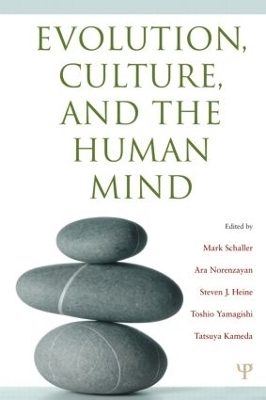
Evolution, Culture, and the Human Mind
Psychology Press (Verlag)
978-0-8058-5911-9 (ISBN)
An enormous amount of scientific research compels two fundamental conclusions about the human mind: The mind is the product of evolution; and the mind is shaped by culture. These two perspectives on the human mind are not incompatible, but, until recently, their compatibility has resisted rigorous scholarly inquiry. Evolutionary psychology documents many ways in which genetic adaptations govern the operations of the human mind. But evolutionary inquiries only occasionally grapple seriously with questions about human culture and cross-cultural differences. By contrast, cultural psychology documents many ways in which thought and behavior are shaped by different cultural experiences. But cultural inquires rarely consider evolutionary processes. Even after decades of intensive research, these two perspectives on human psychology have remained largely divorced from each other. But that is now changing - and that is what this book is about.
Evolution, Culture, and the Human Mind is the first scholarly book to integrate evolutionary and cultural perspectives on human psychology. The contributors include world-renowned evolutionary, cultural, social, and cognitive psychologists. These chapters reveal many novel insights linking human evolution to both human cognition and human culture – including the evolutionary origins of cross-cultural differences. The result is a stimulating introduction to an emerging integrative perspective on human nature.
Arie W. Kruglanski is Professor of Psychology at the University of Maryland. He is recipient of the National Institute of Mental Health Research Scientist Award, the Donald Campbell Award for Oustanding Contributions to Social Psychology, the University of Maryland Regents Award for Scholarship and Creativity and the Distinguished Scientific Contribution Award from the Society for Experimental Social Psychology. He was Fellow at the Center for Advanced Studies in the Behavioral Sciences, and is Fellow of the American Psychological Association and the American Psychological Society. He has served as editor of the Journal of Personality and Social Psychology: Attitudes and Social Cognition, and as editor of the Personality and Social Psychology Bulletin, and as Associate Editor of the American Psychologist. His interests have been in the domains of human judgment and decision making, the motivation-cognition interface, group and intergroup processes, the psychology of human goals, and the social psychological aspects of terrorism. His work has been disseminated in over 250 articles, chapters and books and has been supported by grants from the National Science Foundation, the National Institute of Mental Health, Deutsche Forschungs Gemeineschaft, the Ford Foundation and the Israeli Academy of Science. He has been members of several NAS panels on the social and behavioral aspects of terrorism and presently serves as co-director of the National Center for the Study of Terrorism and the Response to Terrorism.
A. Norenzayan, M. Schaller, S.J. Heine, Introduction. Part 1. How Evolution and Culture Fit Together. P. Rozin, Towards a Cultural/Evolutionary Psychology: Cooperation and Complementarity. R.F. Baumeister, The Human Mind and the Evolution of Cultural Animals. C-Y Chiu, Y. Kim, A. Chaturvedi, Collective Evolution: Revisiting Donald Campbell’s Legacy. Y.C. Dutton, C. Heath, Cultural Evolution: Why Are Some Cultural Variants More Successful Than Others? L.A. Kirkpatrick, From Genes to Memes: Psychology at the Nexus. Part 2. Evolutionary Bases of Cultural Phenomena. S.W. Gangestad, Exploring the Evolutionary Foundations of Culture: An Adaptationist Framework. S. Solomon, J. Greenberg, T. Pyszczynski, F. Cohen, D.M. Ogilvie, Teach these Souls to Fly: Supernatural as Human Adaptation. A.F. Shariff, A. Norenzayan, J. Henrich, The Birth of High Gods: How the Cultural Evolution of Supernatural Policing Influenced the Emergence of Complex, Cooperative Human Societies, Paving the Way for Civilization. R.M. Nesse, Social Selection and the Origins of Culture. T. Kameda, M. Takezawa, Y. Ohtsubo, R. Hastie, Are Our Minds Fundamentally Egalitarian? Adaptive Bases of Different Socio-Cultural Models about Distributive Justice. Part 3. Evolutionary Universals and Cross-Cultural Differences. D. Roberson, Color in Mind, Culture and Language. T. Yamagishi, N. Suzuki, An Institutional Approach to Culture. S. Kitayama, N.A. Bowman, Cultural Consequences of Voluntary Settlement in the Frontier: Evidence and Implications. M. Daly, M. Wilson, Cultural Inertia, Economic Incentives, and the Persistence of "Southern Violence". M. Schaller, D.R. Murray, Infectious Diseases and the Evolution of Cross-Cultural Differences. D.T. Kenrick, S. Nieuweboer, A.P. Buunk, Universal Mechanisms and Cultural Diversity: Replacing the Blank Slate with a Coloring Book. Indexes.
| Erscheint lt. Verlag | 7.10.2009 |
|---|---|
| Zusatzinfo | 2 Tables, black and white |
| Verlagsort | Philadelphia |
| Sprache | englisch |
| Maße | 152 x 229 mm |
| Gewicht | 720 g |
| Themenwelt | Geisteswissenschaften ► Psychologie ► Humanistische Psychotherapien |
| ISBN-10 | 0-8058-5911-X / 080585911X |
| ISBN-13 | 978-0-8058-5911-9 / 9780805859119 |
| Zustand | Neuware |
| Haben Sie eine Frage zum Produkt? |
aus dem Bereich


